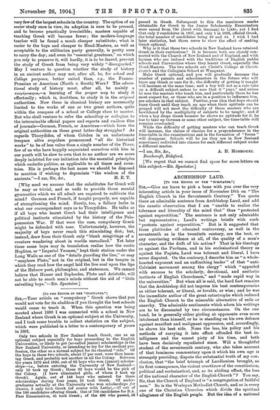Sin,—Your article on "compulsory " Greek shows that you would
not vote for its abolition if you thought the best schools would cease to teach it. When this question was being mooted about 1890 I was connected with a school in New Zealand where Greek is an optional subject at the University, and I took some trouble to collect statistics on the subject, which were published in a letter to a contemporary of yours Only two schools in New Zealand teach Greek, one as an optional subject especially for boys proceeding to the English Universities, or likely to get (so-called junior) scholarships in the New Zealand University, or intending to try for the medical pro- fession, the other as a normal subject for its classical "side." Of the boys in these two schools, about 17 per cent. were then learn- ing Greek, and probably not another in all the Colony. Between the years 1876 and 1890, out of 82 boys who won (junior) scholar- ships—i.e., before entering the University of New Zealand— only 10 took up Greek ; these 82 boys would be the pick of the Colony. (I have eliminated girls, of whom 2 took up Greek). Again, out of 148 boys who entered for those scholarships during four years, 16 took Greek. Of under- graduates actually at the University who won scholarships for classics, 5 only took Greek (of course with Latin),-17 out of the 188 candidates offering Greek. Out of 706 candidates for B.A. Pass Examination, 46 took Greek; of the 496 who passed, 38 passed in Greek. Subsequent to this the maximum marks obtainable for Greek in the Junior Scholarship Examination were raised from 750 (level with German) to 1,000 ; yet I find that only 2 candidates in 1897, and only 1 in 1898, offered Greek, the total number of candidates being 49 and 44. I wish I had later statistics, but these serve to show the effect of making Greek optional.
Why is it that these two schools in New Zealand have retained Greek in their curriculum? It is because both are closely con- nected with the Church of New Zealand and of England, and with laymen who are imbued with the traditions of English publics schools and Universities where they learnt Greek, especially the Head-Masters. The two schools are Christ's College at Christ- church and the Collegiate School at Wanganui.
Make Greek optional, and you will gradually decrease the number of parents and schoolmasters in the future who will know any Greek or care for it; the difficulty of getting it taught will increase at the same time; and a boy will not as a rule take up a difficult subject unless he sees that it " pays," and unless he sees the masters who teach him, and particularly those he has most respect for, or those who are in a position to influence him, are scholars in that subject. Further, your idea that boys should learn Greek until they reach an age when their aptitude can be gauged will not meet the difficulty of those masters who are bewildered by the multiplicity of subjects to bo taught ; and if when a boy drops Greek because he shows no aptitude for it, he has to take up German or some other subject, the time-table still remains overloaded.
While the difficulty of getting masters who can teach Greek will increase, the claims of classics for a preponderance in the time-table in the examinations and in the formation of "forms " will disappear. Schools will be (as they are in New Zealand sometimes) redivided into classes for each different subject under a different master.
—I am, Sir, &c., A. H. HOBH0178E.
ARCHBISHOP LAUD.














































 Previous page
Previous page